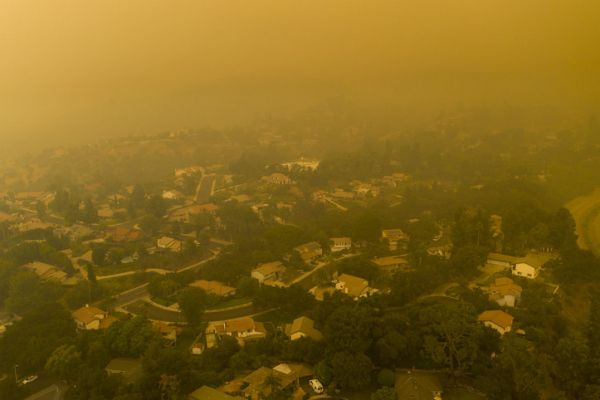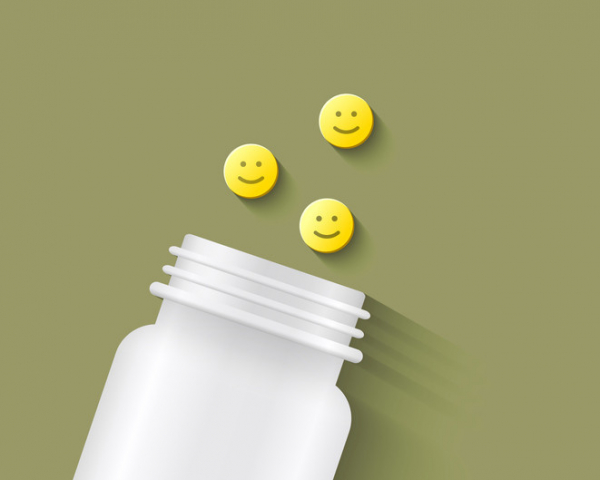
One surprising effect of wildfires: Itchy, irritated skin

Are you finding yourself with itchy, irritated skin that you can’t stop scratching? Or have you wondered why your child’s eczema is suddenly worse and so hard to control? Mounting evidence suggests that wildfires, which are increasing in intensity and frequency, contribute to skin problems, including eczema flares.
What is eczema?
Eczema is a common chronic skin condition that affects about one in 10 people in the US. Its hallmarks are inflamed and dry, itchy patches of skin.
Atopic dermatitis is the most common type of eczema. It can run in families, often beginning in childhood. Typically, in the northern hemisphere, it grows worse during the winter season when the weather is cold and drying. Now some experts are seeing that pattern change. At Massachusetts General Hospital, for example, one dermatologist noted an unusual spike last summer in patients with flare-ups of eczema.
Why is eczema getting worse during summer?
In 2023, Canada experienced more than 6,000 wildfires that burned over 16 million hectares of land — an area larger than the entire state of Georgia. While far away from the devastation, the smoke reached across the US and more than 2,000 miles to Europe. Poor air quality from these distant wildfires caused eye and throat irritation and difficulty breathing.
In Boston, Dr. Arianne Shadi Kourosh, a dermatologist at Massachusetts General Hospital, also began to notice skin symptoms. Normally the dermatology clinics would see fewer than 20 people during a summer month for eczema, including atopic dermatitis. Suddenly that jumped to 160.
Looking back at summer month records from the last four years, her research showed that the number of visits for these skin complaints tracked with the severity of air pollution. These findings are consistent with other research noting an uptick in eczema flares and psoriasis flares associated with wildfire pollution. But why?
Researchers theorize that airborne pollutants might set off a cascade of effects within the body by activating an oxidative stress pathway. This damages the skin barrier and prompts an inflammatory response. This cascade also may play a role in the development of eczema.
What can you do to protect your skin?
Air pollutants in wildfire smoke may harm multiple organs — not just your heart and lungs, but also our skin, it seems. So, when outdoor air quality is bad due to wildfires, limiting your exposure can help reduce health risks. While we can say the same for industrial air pollution, wildfire pollution is likely worse due to its additional toxic particles.
- Seek help if you’re itching. Check with a dermatologist or your health team if you think wildfire smoke or other forms of air pollution might be affecting your skin.
- Check local air quality.AirNow.gov shares local, real-time air quality information and activity guidance. When recommended, stay indoors if possible. Shut doors, windows, and any outdoor air intake vents.
- Protect your skin. When you’re outdoors, wear a mineral-based sunscreen containing zinc or titanium. While most other sunscreens work through a chemical reaction to absorb the ultraviolet (UV) rays that damage skin, zinc and titanium sunscreens help by forming a barrier over skin that reflects off UV rays. The barrier also reduces the amount of pollutant particles getting to the skin to set off the inflammatory cascade. Wearing sunscreen protects against skin cancer, as well.
- Wash up. After coming back inside, cleansing your skin and applying a hypoallergenic moisturizer will help keep it healthy. If you do have eczema, choose cleansers and moisturizing products recommended by your dermatologist or health care provider.
About the Author

Wynne Armand, MD, Contributor
Dr. Wynne Armand is a physician at Massachusetts General Hospital (MGH), where she provides primary care; an assistant professor in medicine at Harvard Medical School; and associate director of the MGH Center for the Environment and … See Full Bio View all posts by Wynne Armand, MD

Is there a good side to drug side effects?

Drug side effects are common, and often quite troublesome.
Major side effects, such as severe or even life-threatening allergic reactions, require immediate treatment and discontinuation of the drug. More minor symptoms may be tolerable when weighed against drug benefits. And sometimes, these go away on their own as the body gets used to the drug.
But there’s another type of side effect you hear much less about: ones that are beneficial. Though uncommon, they’re worth keeping in mind when you’re starting a new medicine.
Aren’t all side effects bad?
The term side effect is usually assumed to be a bad thing. And that’s typically true. But that leaves out the “good” side effects. Relatively little is published on this, so it’s not clear how common they are. But four notable examples include:
- Minoxidil (Rogaine, Gainextra, other brands). Developed in the 1970s for high blood pressure, this drug also increased hair growth in study subjects. What was initially considered a bothersome side effect eventually became its primary use: topical forms of this drug are commonly used to treat hair loss.
- Diphenhydramine (Benadryl or generic versions). This common treatment for allergic conditions has the side effect of drowsiness. For adults with allergy issues and trouble sleeping, the sedative effect can be helpful. Regular, long-term use of diphenhydramine is not recommended, as it may increase the risk of dementia.
- Sildenafil (Viagra or generic versions). Originally developed as a treatment for high blood pressure and angina, it didn’t take long for male users to realize the drug could trigger erections within 30 to 60 minutes. The makers of sildenafil recognized that under the right circumstances, this could be a highly beneficial side effect. In 1998 it was approved as a treatment for erectile dysfunction.
- Semaglutide (Ozempic, Wegovy, Rybelsus). This drug was developed to treat diabetes, but early users noticed reduced appetite and significant weight loss. Now, several formulations of these related drugs are approved for diabetes and/or weight loss.
In the best study I’ve read on the topic, researchers found more than 450 reports of serendipitous beneficial effects of various drugs since 1991. And that may be an underestimation, since report forms did not specifically ask for or label this type of side effect, according to the study authors.
Silver linings: Repurposing and repackaging drugs
While the discovery of helpful drugs can arise unexpectedly, drug developers are increasingly using a more intentional approach: using side effect profiles to look for new uses.
For example:
- A drug reported to cause reduced sweating as a side effect may be effective for hyperhidrosis, a condition marked by excessive sweating.
- Drugs reported to cause low blood pressure as a side effect might be effective treatments for high blood pressure (hypertension).
- New treatments for breast cancer may include older medicines that have a similar side effect profile as known anti-cancer drugs.
The availability of large side effect registries has made this method of identifying drugs for repurposing a more realistic option. So, even negative side effects can have a silver lining.
Bad side effects and the nocebo effect
While side effects can be positive, most are not. Medication side effects are a common reason people give for not taking prescribed drugs regularly. And adverse reactions to medicines prompt up to 8% of hospital admissions, according to one analysis.
To make matters worse, in some cases the expectation of side effects seems to make them more likely to occur. Called the nocebo effect, it increases the chances of experiencing a negative side effect and seems due, at least in part, to expectations. Contrast this with the placebo effect, where a sugar pill or another inactive treatment can lead to benefit.
The bottom line
Many people avoid taking medications because they fear possible side effects. That’s understandable. But not taking a medication can mean missing out on its benefits. And anticipation or expectation of side effects can increase the chances you’ll have them.
So, while it’s important to be aware of the most common side effects caused by the medicines you take, it’s also important not to overestimate your chances of experiencing them. And remember: there’s always a chance you’ll have a side effect you actually welcome.
About the Author

Robert H. Shmerling, MD, Senior Faculty Editor, Harvard Health Publishing; Editorial Advisory Board Member, Harvard Health Publishing
Dr. Robert H. Shmerling is the former clinical chief of the division of rheumatology at Beth Israel Deaconess Medical Center (BIDMC), and is a current member of the corresponding faculty in medicine at Harvard Medical School. … See Full Bio View all posts by Robert H. Shmerling, MD